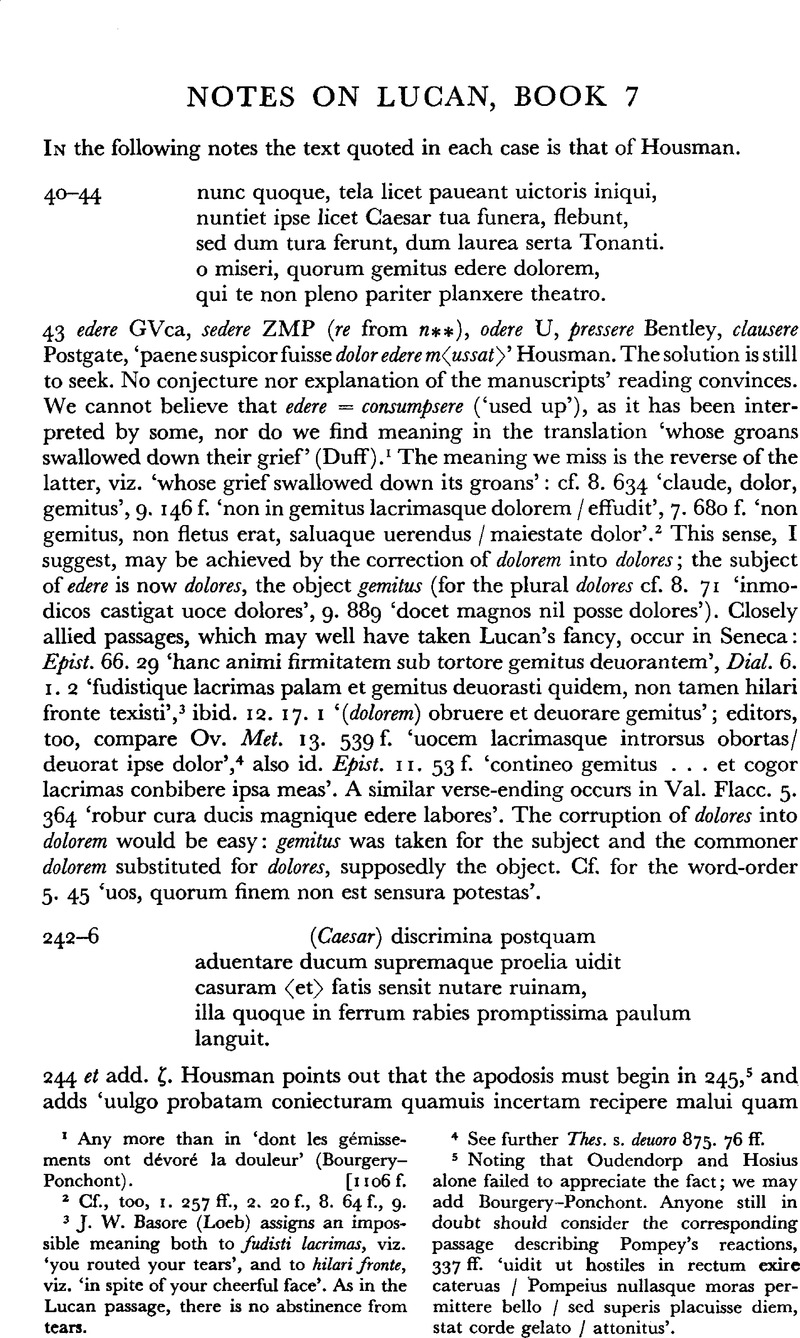Article contents
Notes on Lucan, Book 7
Published online by Cambridge University Press: 11 February 2009
Abstract

- Type
- Other
- Information
- Copyright
- Copyright © The Classical Association 1954
References
page 187 note 1 Any more than in ‘dont les gémissements ont dévoré la douleur’ (Bourgery-Ponchont) [ 1106 f.
page 187 note 2 Cf., too, 1. 257 ff., 2. aof., 8. 64 f., 9.
page 187 note 3 J. W. Basore (Loeb) assigns an impossible meaning both to fudisti lacrimas, viz. ‘you routed your tears’, and to hilari fronte, viz. ‘in spite of your cheerful face’. As in the Lucan passage, there is no abstinence from tears.
page 187 note 4 See further Thes. s. deuoro 875. 76 ff.
page 187 note 5 Noting that Oudendorp and Hosius alone failed to appreciate the fact; we may add Bourgery-Ponchont. Anyone still in
doubt should consider the corresponding passage describing Pompey's reactions, 337 ff. ‘uidit ut hostiles in rectum exirc cateruas / Pompeius nullasque moras permittere bello / sed superis placuisse diem, stat corde gelato / attonitus’.
page 188 note 1 Bourgery and Ponchont curiously detect a dative in fatis and give the remarkable rendering ‘il sentit vaciller les destins prets a s'écrouler’. Heinsius and Bentley would read cessuram; they had not observed I. 141 ‘quamuis primo nutet casura sub Euro(quercus)’.
page 188 note 2 Similar cases are, for example, Tac. Hist. 5. 10 ‘fato aut taedio occidit’, Ann. 2. 42 ‘finem uitae sponte an fa to impleuit’, Soph. 0. T. 949 ![]() (sc. ∏όλυηος).
(sc. ∏όλυηος).
page 188 note 3 Cf. Heitland, , Introd., p. civ.Google Scholar
page 189 note 1 Cf. ‘non est morata Fortuna in euertendis tot rerum ponderibus’ (Schol.).
page 189 note 2 Similarly, no parallel is to be found in the cases listed by Thes. s. diu 1559. 82 under the meaning tarde, lente, e.g. Sen. Contr. 2. 3. 10 ‘hoc certe impetrem, ne diu moriar’ (‘that I do not die a lingering death’).
page 189 note 3 No more do we approve the rendering ‘Chance who was overthrowing so many weighty interests did not long withhold the dire downfall whirled on by destiny’ (Owen, S. G., C.R. xi, 1897, p. 169),Google Scholar whereby violence is done to the meaning of abstulit. See note on 505 below.
page 189 note 4 See list of exx. in Heitland's Introd., p. xc.
page 189 note 5 Editors compare Sen. Med. 391 ‘quo pondus animi uergat’ and Virg. Aen. 12. 727 ‘quo uergat pondere letum’.
page 189 note 6 Observing that ‘the change is an easy one', ciet, it may be pointed out, is suspect from the start, as the adjective obliquas calls for a verb which enables it to be taken predicatively.
page 190 note 1 C.R. xi, 1897, p. 169.Google Scholar
page 190 note 2 See, however, the observations made below on the relationship of the metuens-clause to tenet.
page 190 note 3 Cf., too, Plutarch, Caes. 44. 2 ff. ![]()
![]() (also Pomp. 69. 2 ff.).
(also Pomp. 69. 2 ff.).
page 191 note 1 Gnomon, ii, 1926, p. 530.Google Scholar
page 191 note 2 A different matter is Virg. Aen. 6. 377 ‘dicta …duri solacia casus’, or Ov. Pont. 4. 2. 45 ‘Pierides, solacia frigida’.
page 191 note 3 2. 91, 6. 802, 8. 314 and 354, 9. 870 and 878.
page 191 note 4 ‘haud secus, occuluit saxi quos uertice fetus / ales fulua Iouis, tacito si ad culmina nisu / euasit serpens terretque …ilia …nidi circumuolat orbem’. Nor do we find convincing parallels in the passages cited by H. at Manil. 4. 534 (‘se quisque et uiuit et effert’), to which he refers.
page 191 note 5 For the usage cf. Ov. Met. 14. 35 ‘ut tua sim uoueo’.
page 191 note 6 Housman deals with this type of omission in his introduction p. xix. He regards ‘homoeomeson’ as being responsible for the transposition of 6. 389 in U and the apparent transposition of 9. 538–43 in all manuscripts; see, too, his note on 9. 633. To H.'s list of omissions caused by ‘homoeomeson’ may be added 7. 607, omitted in ZM probably owing to the presence of iam in both 606 and 607. It seems likely, too, that 7. 463 owes its transposition in ZMU to the similar sequence ant in 463 and 462.
page 192 note 1 For the common confusion of haud and aut in MSS. see Hofmann, J. B., I.F. xliii, 1925, 96 2.Google Scholar In Lucan aut is wrongly read for haud in one or more MSS. in 1. 460, 3. 375 and 466, 4. 275 and 814, 7. 297, 8. 551, 9. 369.
page 192 note 2 Francken, however, is dissatisfied with the text and believes that 752–4 represent verses rejected by the poet and replaced by 755–7.
page 192 note 3 Similar exx. in this book of -uit being read for -bit in some MSS. are 447 spectauit M, 458 ornauit II, 459 iurauit MZ(C), 702 intrauit MPZC, 815 uocauit C.
page 193 note 1 Postgate seems not unattracted by in-plebit, but in the event of its being read would strangely place a heavy stop after auri, evidently misled by the lack of an expressed object to rapiant. The three relative clauses are, of course, inseparable and are understood as the object of the latter verb.
page 193 note 2 Postgate suggests that the reading receives some support from the imitation of Statius, Silu. 3. 3. 92 quodque legit. It in fact receives none, for here all the other tenses are present and the perfect would give an unsuitable sense.
- 2
- Cited by


